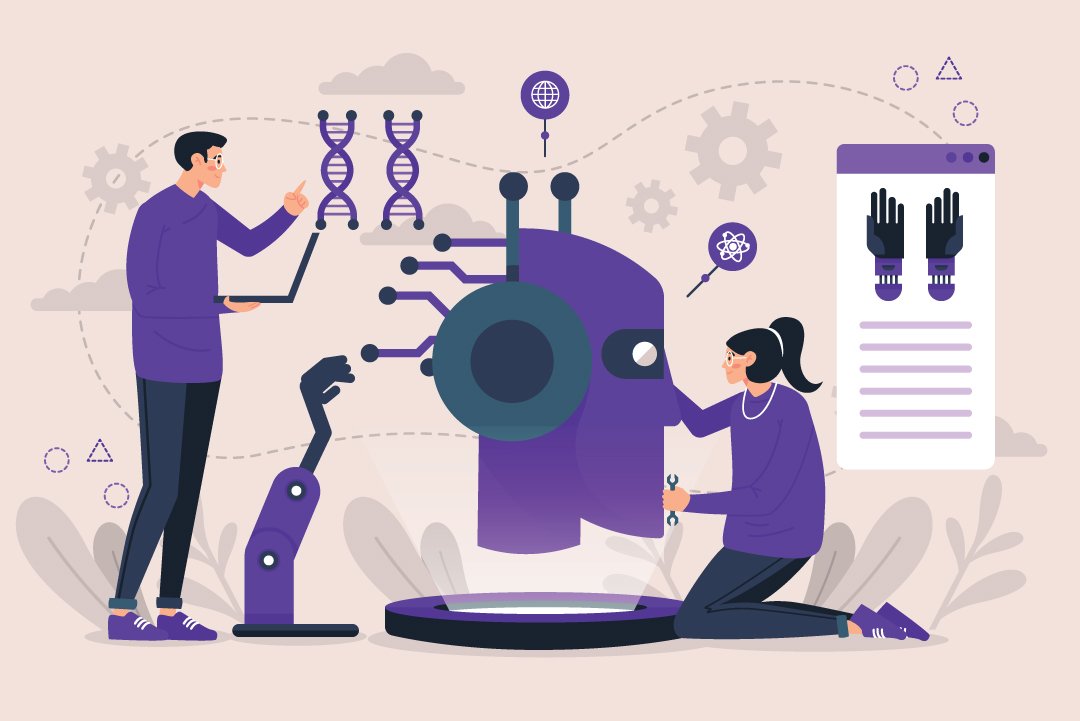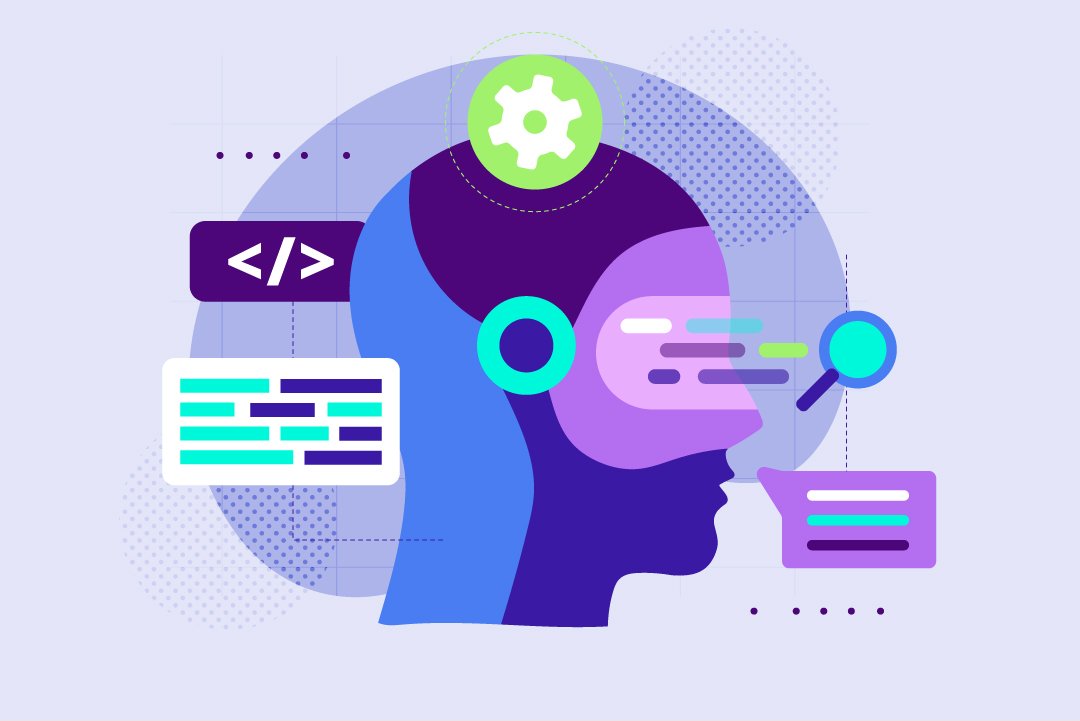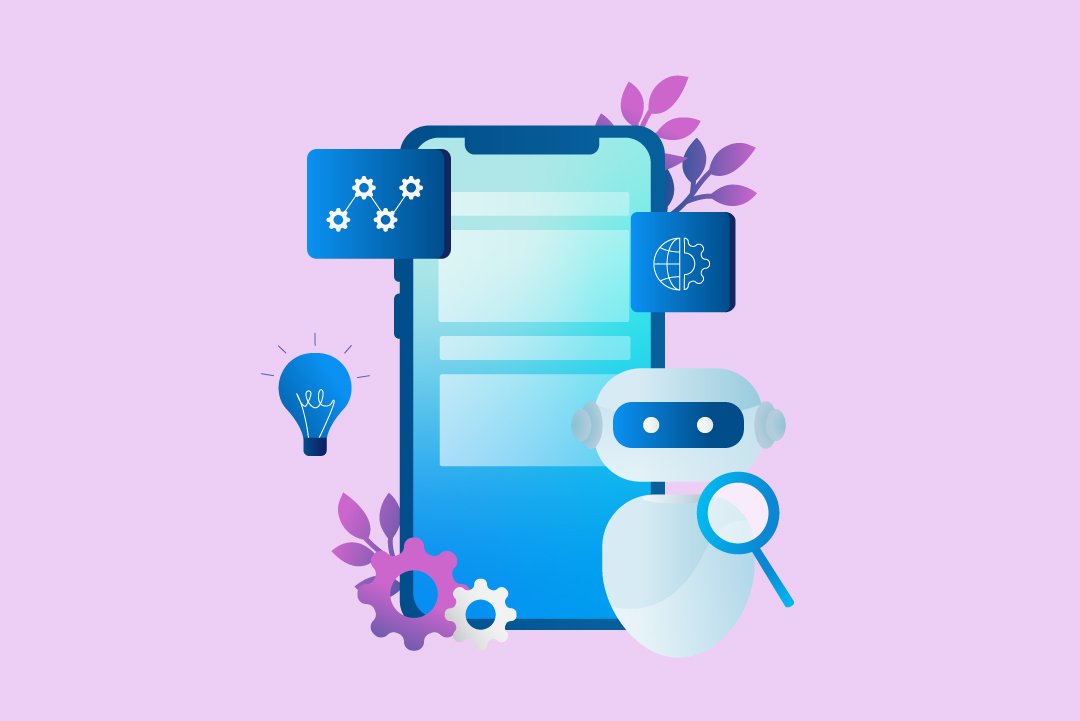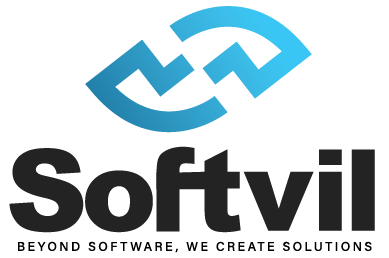Artificial intelligence (AI) and machine learning (ML) are revolutionizing mobile app development in today’s fast-paced digital landscape. Understanding the technical intricacies of AI and ML is crucial for developers and businesses alike. This knowledge not only helps in making informed decisions but also in leveraging these technologies to their full potential. This article delves into the technical aspects of AI and ML in mobile apps, exploring the technologies, algorithms, and frameworks that drive their development along with key differences between AI vs Machine Learning, Generative AI vs Machine Learning.
Technical Overview of AI and ML

Basic Principles and Components
At its core, AI refers to the simulation of human intelligence processes by machines, particularly computer systems. These processes include learning (acquiring information and rules for using it), reasoning (using rules to reach approximate or definite conclusions), and self-correction. Machine learning, a subset of AI, focuses on the development of algorithms that allow computers to learn from and make predictions or decisions based on data.
The basic components of AI and ML in mobile apps include:
- Data Collection and Preparation: Gathering relevant data and transforming it into a suitable format for training algorithms.
- Model Building: Developing models using various ML algorithms to make predictions or decisions.
- Training and Testing: Training the model with data and testing its performance.
- Deployment: Integrating the model into the mobile app for real-time use.
- Monitoring and Maintenance: Continuously monitoring the model’s performance and making necessary updates.
How AI and ML Processes Work
AI and ML processes in mobile app development typically follow these steps:
- Data Acquisition: Collecting data from various sources, such as user interactions, sensors, and databases.
- Data Preprocessing: Cleaning and transforming the data into a usable format.
- Model Training: Using algorithms to train the model on the preprocessed data.
- Model Evaluation: Testing the model’s performance on unseen data to ensure it generalizes well.
- Model Deployment: Integrating the trained model into the mobile app for user interactions.
- Continuous Learning: Updating the model with new data to improve its accuracy and efficiency over time.
AI vs. Machine Learning
AI and machine learning are often used interchangeably, but they are distinct concepts. AI is a broad field encompassing the simulation of human intelligence in machines, enabling them to perform tasks that typically require human cognition. Machine learning, a subset of AI, focuses specifically on algorithms that enable machines to learn from data and improve over time without being explicitly programmed.
Generative AI vs. Machine Learning
Generative AI, a specialized area within machine learning, involves creating models that generate new content, such as text, images, or music, based on learned patterns from existing data. While traditional machine learning models primarily focus on making predictions or classifications, generative AI aims to create new, original data, pushing the boundaries of creativity and innovation in AI applications.
Common Algorithms and Techniques

Overview of Key Algorithms
Several algorithms and techniques are commonly used in AI and ML for mobile app development. Some of the key ones include:
- Neural Networks: These are computational models inspired by the human brain, consisting of layers of interconnected nodes. Neural networks are particularly effective in handling large datasets and complex patterns, making them ideal for image and speech recognition tasks.
- Decision Trees: These models use a tree-like structure to make decisions based on input features. Decision trees are easy to interpret and useful for classification and regression tasks.
- Support Vector Machines (SVM): SVMs are supervised learning models used for classification and regression analysis. They work well with high-dimensional data and are effective in text classification and image recognition.
- K-Nearest Neighbors (KNN): This algorithm classifies data points based on the majority vote of their neighbors. It is simple and effective for tasks like recommendation systems and anomaly detection.
- Clustering Algorithms: These algorithms group similar data points together, which is useful for tasks such as customer segmentation and image compression.
Examples of Algorithm Applications in Mobile Apps
- Image Recognition: Neural networks, particularly convolutional neural networks (CNNs), are used in apps like Google Photos to identify and categorize images.
- Voice Assistants: Natural language processing (NLP) algorithms and recurrent neural networks (RNNs) power virtual assistants like Siri and Google Assistant, enabling them to understand and respond to voice commands.
- Recommendation Systems: Algorithms like KNN and collaborative filtering are used in apps like Netflix and Spotify to recommend content based on user preferences.
- Fraud Detection: Decision trees and clustering algorithms help in identifying fraudulent activities in banking and finance apps.
- Personalized Marketing: Machine learning models analyze user behavior and preferences to deliver personalized advertisements and promotions in e-commerce apps.
Popular Frameworks and Tools

Overview of Frameworks
Several frameworks and tools are available to facilitate AI and ML in mobile app development. Some of the most popular ones include:
- TensorFlow: An open-source framework developed by Google, TensorFlow is widely used for building and deploying ML models. It supports a range of tasks from image and speech recognition to reinforcement learning.
- PyTorch: Developed by Facebook’s AI Research lab, PyTorch is known for its flexibility and ease of use. It is particularly popular in the research community for developing deep learning models.
- Core ML: Apple’s machine learning framework, Core ML, is optimized for on-device performance. It allows developers to integrate ML models into iOS apps seamlessly.
- Keras: A high-level neural networks API, Keras runs on top of TensorFlow. It is user-friendly and allows for quick prototyping of deep learning models.
- Scikit-learn: A machine learning library for Python, Scikit-learn is known for its simplicity and efficiency. It provides simple and efficient tools for data mining and data analysis.
Pros and Cons of Each Tool
TensorFlow:
Pros: Highly scalable, extensive support for various ML tasks, strong community support.
Cons: Steeper learning curve, can be complex for beginners.
PyTorch:
Pros: Flexible and easy to use, dynamic computation graph, strong community support.
Cons: Not as mature in production deployment as TensorFlow, smaller community compared to TensorFlow.
Core ML:
Pros: Optimized for on-device performance, seamless integration with iOS apps, supports various model formats.
Cons: Limited to Apple ecosystem, less flexible for custom models.
Keras:
Pros: User-friendly, quick prototyping, integrates well with TensorFlow.
Cons: Limited to neural network models, not as performant for complex tasks as lower-level frameworks.
Scikit-learn:
Pros: Simple and efficient, extensive library of algorithms, great for beginners.
Cons: Limited support for deep learning, not suitable for large-scale data processing.
Application Development Outsourcing

Advantages of Outsourcing
Outsourcing application development, particularly in the realm of AI and ML, can offer several advantages:
- Cost Efficiency: Outsourcing can significantly reduce development costs as compared to in-house development, particularly when leveraging lower-cost regions.
- Access to Expertise: Partnering with specialized development firms provides access to skilled AI engineers and data scientists who have extensive experience in the field.
- Faster Time to Market: Outsourcing allows companies to expedite the development process, leveraging the expertise and resources of external teams to bring products to market more quickly.
- Scalability: Outsourcing offers the flexibility to scale development efforts up or down based on project requirements and market demands.
Considerations for Outsourcing
When considering mobile development outsourcing, it’s essential to evaluate potential partners based on their expertise, experience, and track record in AI and ML. Key considerations include:
- Technical Proficiency: Ensure that the outsourcing firm has a strong background in AI and ML technologies and is proficient in relevant frameworks and tools.
- Portfolio and Case Studies: Review the firm’s portfolio and case studies to gauge their experience in developing AI-powered mobile apps.
- Communication and Collaboration: Effective communication and collaboration are crucial for the success of outsourced projects. Ensure that the firm has robust communication practices in place.
- Data Security: AI and ML projects often involve handling sensitive data. Ensure that the outsourcing partner adheres to stringent data security protocols.
AI Mobile App Development

Hiring AI Engineers
How can you hire AI engineers? Hiring skilled AI engineers is critical for the success of AI-powered mobile app development. Here are some tips for hiring the right talent:
- Technical Skills: Look for engineers with strong expertise in AI and ML algorithms, data preprocessing, and model deployment. Familiarity with frameworks like TensorFlow, PyTorch, and Core ML is essential.
- Experience: Prior experience in developing AI-powered mobile apps is a significant advantage. Review candidates’ portfolios and previous projects.
- Problem-Solving Ability: AI engineers should have strong problem-solving skills and the ability to think creatively to develop innovative solutions.
- Communication Skills: Effective communication is essential for collaborating with other team members and stakeholders. Look for engineers who can articulate complex technical concepts clearly.
AI Mobile App Development Best Practices
- Focus on User Experience: Ensure that the integration of AI and ML enhances the user experience. Avoid overly complex features that may confuse users.
- Optimize for Performance: AI models can be resource-intensive. Optimize models for on-device performance to ensure smooth and responsive app experiences.
- Continuous Improvement: AI and ML models should be continuously updated and improved based on user feedback and new data. Implement mechanisms for regular updates and improvements.
Ethical Considerations: Consider the ethical implications of AI and ML applications. Ensure that models are fair, transparent, and do not discriminate against any user groups.
Conclusion
AI and ML are transforming mobile app development, enabling the creation of intelligent and responsive applications. Understanding the technical aspects of these technologies, including the algorithms, frameworks, and best practices, is essential for developers and businesses looking to leverage their potential. By exploring the various components, common algorithms, and popular tools, and considering outsourcing and hiring strategies, stakeholders can effectively harness AI and ML for innovative mobile app solutions. As the field continues to evolve, ongoing learning and adaptation will be key to staying ahead in this dynamic landscape.
FAQs
AI simulates human intelligence, while machine learning is a subset of AI that enables apps to learn from data and improve over time.
Neural networks use interconnected nodes to process data and recognize patterns, powering features like image and speech recognition.
TensorFlow is scalable, supports various ML tasks, and has strong community support, making it ideal for complex mobile app development.
Outsourcing reduces costs, provides access to skilled AI engineers, speeds up development, and offers scalability.
Generative AI creates new content from existing data, enhancing apps with personalized content and creative features.
About Softvil
Softvil is a leading technology company specializing in artificial intelligence (AI) and mobile app development. With a strong focus on innovation, Softvil leverages cutting-edge AI technologies and advanced machine learning algorithms to create intelligent, user-centric mobile applications. Their expertise spans various industries, delivering custom solutions that enhance user experience, optimize business processes, and drive digital transformation. Known for their skilled team of AI engineers and developers, Softvil excels in crafting high-performance apps that meet the dynamic needs of today’s digital landscape.

